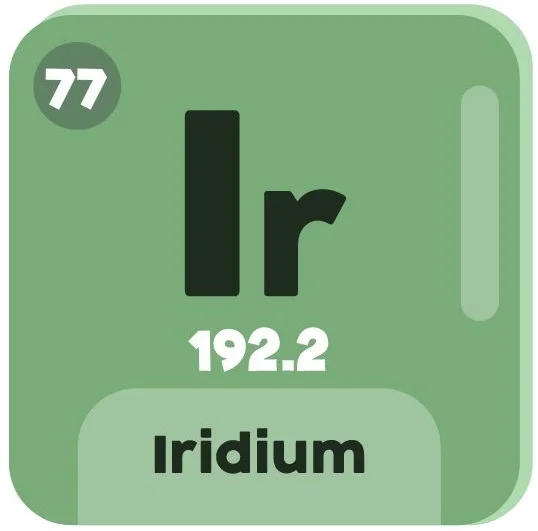Iridium, a rare metal, is utilized in homeopathy for its therapeutic properties in treating a variety of conditions, particularly those related to intestinal putrefaction, septicemia, and anemia.
It is indicated for patients suffering from exhaustion after disease, epilepsy, lupus, and various forms of rheumatism and gout.
The remedy is especially beneficial for children who appear weak and are growing too rapidly, as well as for conditions like nephritis during pregnancy.

Table of Contents
ToggleSOURCE INFORMATION
Scientific Classification
- Element: Iridium
- Symbol: Ir
- Atomic Number: 77
- Category: Transition Metal
Origin
- Iridium is obtained from platinum ores and is known for its high density and corrosion resistance.
- It is primarily used in electrical contacts, spark plugs, and as a hardening agent for platinum.
Historical Facts
- Discovered in 1803 by Smithson Tennant, iridium was named after the Greek goddess Iris, reflecting its colourful compounds.
- Historically, iridium has been used in industrial applications but found its place in homeopathy for its unique healing properties.
DRUG PATHOGENESIS
- Iridium’s therapeutic effects are attributed to its influence on the blood, nervous system, and musculoskeletal system.
- It enhances the formation of red blood cells and aids in addressing issues of intestinal decay and infection.
- It also plays a role in alleviating neurological disturbances, especially following systemic illnesses.
PHYSICAL CONSTITUTION
Individuals requiring Iridium often exhibit:
- Weakness and exhaustion after illnesses.
- Anemia with signs of decreased vitality.
- Puny, weak-limbed children who are growing too rapidly.
- A tendency toward nervous disorders and joint pain.
DIATHESIS
- Anaemic Diathesis: Patients with low haemoglobin levels and general weakness.
- Neurotic Diathesis: Individuals showing signs of nervous disorders, particularly after chronic illnesses.
TEMPERAMENTS
- Melancholic: Those who feel a lack of energy and motivation, often accompanied by mental confusion.
- Sensitive: Individuals who are easily affected by their environment and may exhibit physical symptoms in response to stress.
KEY CHARACTERISTICS
- Cognitive Issues: Difficulty concentrating and a feeling of mental void.
- Respiratory Distress: Chronic cough and inflamed posterior nares with thick discharge.
- Musculoskeletal Weakness: Particularly in the lumbar region and lower extremities.
- Children’s Symptoms: Puny and weak children with rapid growth rates.
DETAILED ORGAN SYMPTOMS
HEAD
- Difficult concentration: Patients may feel as if their mind is void or confused.
- Sensation of “woodiness”: A peculiar feeling on the right side of the head.
- Sensitivity: Increased sensitivity of the right scalp.
- Profuse coryza: Watery nasal discharge that improves indoors.
RESPIRATORY
- Hoarse cough: Worsens with talking; associated with raw feelings in the throat.
- Chronic laryngeal catarrh: Thick, yellowish discharge from the nasal passages.
BACK AND EXTREMITIES
- Weakness in the kidney region: Often felt as fatigue or dull pain.
- Spinal paresis: Especially common in the elderly or after prolonged illness.
- Groin and thigh discomfort: Pressing sensations in the left thigh and tension in both thighs.
- Dislocated feeling: Patients may describe a dislocated feeling in the left hip joint.
MODALITIES
- Worse: During physical exertion, cold weather, and mental strain.
- Better: When resting or in warm environments.
WHAT ARE MODALITIES IN HOMOEOPATHY?
RELATIONSHIP WITH OTHER DRUGS
Complementary Remedies
- Iridium Chloride: Noted for causing salivation and nervous symptoms.
- Platina: Similar action on the nervous system.
- Palladium: Comparable in treatment for anemia and nervous disorders.
DOSE
- Recommended Potency: Sixth potency and higher.
Frequently Asked Questions (FAQs)
What conditions is Iridium used to treat?
- Iridium is used for conditions like intestinal putrefaction, anemia, epilepsy, and rheumatism.
How does Iridium affect children?
- It is beneficial for children who are puny and weak-limbed, particularly those growing too rapidly.
What are the mental symptoms associated with Iridium?
- Patients may experience confusion, difficulty concentrating, and a sensation of mental void.
Is Iridium effective for respiratory issues?
- Yes, it helps with chronic cough and respiratory inflammation.
Glossary
- Septicemia: Blood poisoning caused by bacteria or their toxins.
- Anaemia: A condition characterized by a deficiency of red blood cells or haemoglobin.
- Coryza: Inflammation of the nasal mucous membrane, resulting in a runny nose.
- Laryngeal Catarrh: Inflammation of the larynx, often accompanied by mucous discharge.
- Paresis: Partial loss of voluntary movement or control.
- Putrefaction: The process of decay or rotting in a body or other organic matter.
This comprehensive overview of Iridium Metallicum provides insight into its use in homeopathy for treating various ailments and symptoms.
